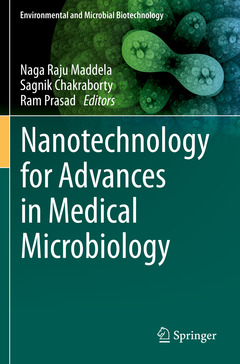Description
Nanotechnology for Advances in Medical Microbiology, 1st ed. 2021
Environmental and Microbial Biotechnology Series
Language: English
Subjects for Nanotechnology for Advances in Medical Microbiology:
Publication date: 03-2022
427 p. · 15.5x23.5 cm · Paperback
Publication date: 03-2021
427 p. · 15.5x23.5 cm · Hardback
Description
/li>Contents
/li>Biography
/li>Comment
/li>
Combined fields of Microbiology and Nanotechnology have been most successful in providing novel solutions for protecting the health of humans and environment. This book covers the implications of nano-strategies to combat bacterial pathogens, applications of nanotechniques in microbiology, and innovative advances in the area of medical microbiology. Contents are divided into three sections -- Nanoscience in controlling bacterial pathogens, Nanoscience in Microbiology, Medical Microbiology. This volume is going to provide timely information about the technological advances of Nanoscience in the domain of Microbiology, with a special emphasis on Pathobiology. The book is a useful read for students and researchers in microbiology, nanotechnology and medical microbiology.
Naga Raju Maddela received his M.Sc. (1996–1998) and Ph.D. (2012) in Microbiology from Sri Krishnadevaraya University, Anantapuramu, India. During his doctoral program in the area of Environmental Microbiology, he investigated the effects of industrial effluents/insecticides on soil microorganisms and their biological activities and worked as a Faculty in Microbiology for 17 years, teaching undergraduate and postgraduate students. He received “Prometeo Investigator Fellowship” (2013–2015) from Secretaría de Educación Superior, Ciencia, Tecnología e Innovación (SENESCYT), Ecuador, and “Postdoctoral Fellowship” (2016–2018) from Sun Yat-sen University, China. He also received external funding from “China Postdoctoral Science Foundation” in 2017, internal funding from “Universidad Técnica de Manabí” in 2020, worked in the area of Environmental Biotechnology, participated in 19 national / international conferences, and presented research data in China, Cuba, Ecuador, India and Singapore. Currently, he is working as a full-time Professor at the Facultad de Ciencias de la Salud, Universidad Técnica de Manabí, Portoviejo, Ecuador. He has published 4 Books (Springer), 2 Chapters (InTech Open / Springer) and 42 research papers.
Sagnik Chakraborty Completed M.Sc. in Biotechnology (2006-2008) from Bangalore University and Ph.D. from National Institute of Technology Durgapur in 2014 Department of Biotechnology, India. His research work focused on the removal of the dyes by biomass-derived from waste materials and removal of the dyes from an industrial outlet of the textile plants- biomass derived from the various waste. Until now, he published forty papers according to the research findings. He has received several awards during his research career. He has mentored undergraduate and postgraduate students for their projects. Furthermore, Sagnik completed his Post-Doctoral Research 2015-2018 from Hebei University of Technology, Tianjin, PR China, the fund a




